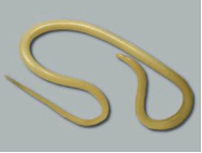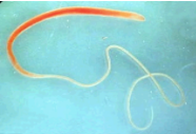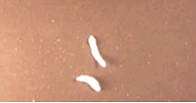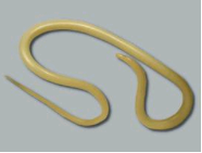Parasites, or worms, are organisms that live at the expense of other animals. Dogs and cats commonly host parasitic infections which may be a health concern for both you and your pet. Intestinal parasites live primarily in the stomach and intestines where they feed off the host tissues and intestinal content. The amount of damage done depends on the type and number of parasites. Intestinal parasites are diagnosed by checking a fresh stool sample for eggs which are shed by the adult worm in the intestinal tract.
There are four species of worms commonly seen in dogs and cats:
 ROUNDWORMS
ROUNDWORMS
These are longer (2-4 inches), round, white worms which may be seen in vomit or passed in the stool. Puppies and kittens may be infected by the mother while in the uterus or while nursing (through the milk). Older pets are infected by contact with contaminated stool/soil or eating other animals (rabbits, mice, rats & earthworms) that have been exposed to roundworm eggs. In large numbers, these worms may cause malnutrition, diarrhea, pot-bellied appearance and intestinal obstruction.
 HOOKWORMS
HOOKWORMS
These worms are microscopic (not seen with the naked eye) and can be the most harmful of the internal parasites. The mouth parts of this worm have a number of hooks which tear at the intestinal wall causing excessive blood loss. Infection occurs through contact with contaminated stool/soil. Hookworm larvae can actually penetrate the skin, or puppies may be infected through the mother’s milk. Bloody diarrhea, weight loss, and anemia are possible signs of a severe hookworm infection.
 WHIPWORMS
WHIPWORMS
Whipworms are also microscopic worms which live in the lower intestinal tract. They can be difficult to diagnose because the eggs are shed intermittently. Infection occurs by eating the eggs which can remain in the environment for a long time.
 TAPEWORMS
TAPEWORMS
Tapeworm segments are shed intermittently and can be seen as small, rice-like segments either in the stool or attached to the hair around the anus. Fecal exams may not pick up this parasite. Animals become infected by eating rabbits, birds and rodents or through fleas. They do not directly get tapeworms from other animal’s stool.
PUBLIC HEALTH SIGNIFICANCE:
- Human infection with roundworm and hookworm larvae is possible but does not occur frequently.
- Eating contaminated stool or soil (roundworms) or direct contact with infected soil (hookworms) is necessary for human infection.
- Children are at greatest risk because of their play and indiscriminate eating habits.
INTESTINAL PARASITE PREVENTION:
Have a routine fecal exam checked every 6-12 months.
- Fresh samples less than 12hrs old. Refrigerate if > 2hrs. Avoid samples that have been in contact with soil for prolonged times.
- Clearly identify the stool donor (avoid sample mix-ups)
- Kitty litter mixed with sample is acceptable as long as the sample is fresh.
- Avoid frozen samples or dried out, hard samples.
- Collect in a clean, sealed container. (Provided upon request)
Once diagnosed use a specific dewormer for the type of parasite found.
- Follow the recommended deworming schedule and recheck fecals as directed.
- Over the counter, broad-spectrum dewormers are often not effective.
Do not allow animals to urinate/defecate in children’s play area or sand box.
Prevent your pet from eating rabbits, rodents, birds and control fleas (tapeworms).
Check fecal and deworm dogs before breeding and again prior to whelping to prevent/reduce infecting puppies.
Deworm puppies at 3 weeks and 6 weeks of age. Follow up with a fecal exam at 12 weeks of age.
- Eggs can remain infective in soil for years, especially in dog pens or areas where pets are tied.
- Replace dirt runs with concrete.
- Turn soil over to depth of 8-12 inches after pet has been dewormed.
- Move your pet to a new uncontaminated area.
- Remove feces from your lawn or kennel daily
Practice and teach children good hygiene when playing with animals, especially puppies and kittens.
Walk and exercise your dog in areas not frequented by other dogs. Avoid public parks, playgrounds, hunting grounds etc..
Use a monthly heartworm preventative that also helps control intestinal parasites. We recommend using Interceptor Plus as your monthly heartworm preventative and broad-sprectrum intestinal parasite preventative.

